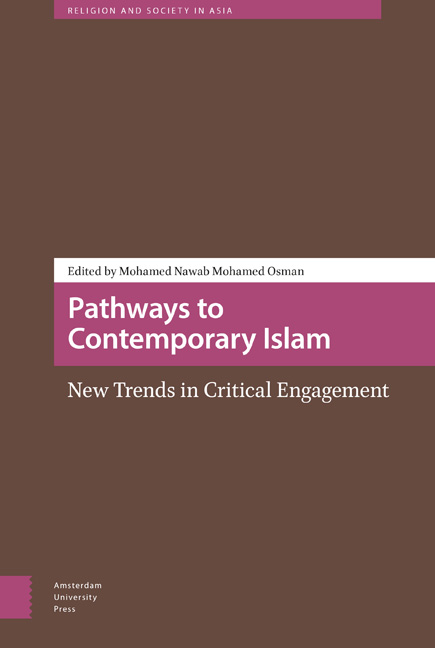Book contents
- Frontmatter
- Dedication
- Contents
- Acknowledgements
- Introduction: Constructing Pathways to Contemporary Islam
- Section 1 Historical Trends in Contemporary Perspective
- Section 2 Contesting the Islamic Intellectual Tradition
- Section 3 Beyond the Arab Revolutions: Political Islam Revised
- Section 4 Contemporary Spaces of Critical Engagement
- Notes on the Contributors
- Index
10 - The Ethical in Shari’a Practices: Deliberations in Search of an Effective Paradigm
Published online by Cambridge University Press: 25 November 2020
- Frontmatter
- Dedication
- Contents
- Acknowledgements
- Introduction: Constructing Pathways to Contemporary Islam
- Section 1 Historical Trends in Contemporary Perspective
- Section 2 Contesting the Islamic Intellectual Tradition
- Section 3 Beyond the Arab Revolutions: Political Islam Revised
- Section 4 Contemporary Spaces of Critical Engagement
- Notes on the Contributors
- Index
Summary
Abstract
The article examines the culture of renewal and critical engagement through the practice of critical traditionalism as a way of balancing tradition and innovation. In this sense, individual reasoning (ijtihad) implies the use of history and knowledge of the past to provide an account of the present by accepting the contemporary knowledge of modernity. This chapter exemplifies the practice of critical traditionalism in the reflections of Muhammad Taqi Usmani and Yusuf al-Qaradawi on issues such as slavery. Nonetheless, it acknowledges the dangerous lack of critical engagement with tradition, acknowledging the need to rethink the Islamic system of faith (deen) by drawing inspiration from Muslim thinkers like al-Ghazali, who called for intellectual humility and the acceptance of plurality and multiplicity of meaning.
Keywords: Islamic ethics; ijtihad; Shariah; Plurality
Contemporary Muslim ethics is in a dire need to foster a vibrant ethical paradigm derived in part from the methodology of the shariʿa but also has to go beyond the limitations of its historical methodology. The gap between the religious and the ethical must be narrowed by insisting on creative approaches to problems facing the global community of Muslims. In this chapter, I explore the relationship between religion and morality. Acknowledging that the idea of shariʿa is fundamental to Muslim tradition, and that this tradition is a guiding factor in Muslim life, I provide a brief overview of how different Muslim intellectuals have conceptualized the shariʿa in innovative ways. I use a contemporary case study to demonstrate how interpreting the shariʿa through a juridical lens can often bely the Qurʾanic mandate to respect human dignity. I insist that today the shariʿa must be properly understood as an ethical paradigm, as it once was.
Muslim jurists in the past were aware of at least two aspects in the pursuit of the ethical. First, they coupled religion to morals. Second, they voiced the need to pursue intellectual creativity and innovation. Contemporary Muslim scholarship in ethics could profit from a deepened conversation around each aspect. Granted, ethics and morals are closely associated with the idea of religion (din) in the history of Muslim thought. But in contemporary times this debate requires a better distillation, elaboration, and application. Explorations in ethical debates would profit from embracing an interdisciplinary field of knowledge with a fondness for experimentation.
- Type
- Chapter
- Information
- Pathways to Contemporary IslamNew Trends in Critical Engagement, pp. 235 - 264Publisher: Amsterdam University PressPrint publication year: 2020

